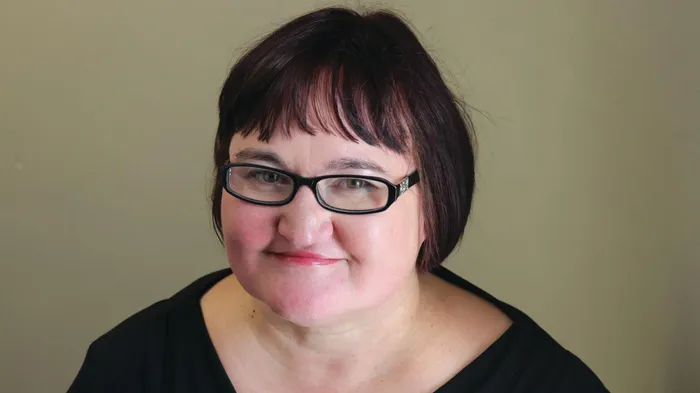
Dr Lize Barclay is a senior lecturer in Futures Studies and Systems Thinking at Stellenbosch Business School at Stellenbosch University.
Image: Supplied.
Dr Lize Barclay
We wash dishes and sit in traffic while Artificial Intelligence (AI) generates images, writes stories, makes movies, and composes music. This is not entirely the future science fiction and experts prepared us for. While AI itself is around 70 years old, it was Open AI’s ChatGPT that moved it from functioning in the background to being available to anybody connected to the internet on 30 November 2022, acquiring a million registered users within only five days.
Since then, a bouquet of AI tools has allowed users to generate images within seconds that would have taken artists and designers days, if not weeks, to create. Poetry and entire books are written in a flash that would have taken a tortured poet weeks of agony. This led to philosophers, artists, and everyday people asking: Did AI bring on the end of creativity, innovation and invention?
Innovation
As we celebrate World Creativity and Innovation Day on 21 April, we should also take a moment to reflect on this very important question. Creativity transforms our imagination into ideas, perspectives and new concepts. Inventions take creativity one step further and turn those ideas into a new product or process. Innovation takes inventions and ideas and turns them into a practical application and something valuable. We have become extremely specialised in society, with creativity, invention and innovation much sought after but relegated to the creatives, thinkers, innovators, inventors, designers and artists.
Before this extreme specialisation on the one hand, and with screens taking over our lives on the other hand, people spent their free time creating art, knitting, drawing, doing embroidery or woodwork. Arts and crafts go back to the early human societies as an inevitable human expression. Dancing, singing and making music have also been very much an everyday pursuit for many people. Although expert performers, artists and crafters have always existed, so has the human need for creative expression. Many scientists and inventors throughout history were hobbyists who made their breakthroughs at home. Innovation was an everyday survival activity and not something seen dressed up in organisational mandates.
Creativity
As children, we were often encouraged to play and create, but then we slowly abandon that for serious and adult pursuits such as the routine tasks schools and work force upon us. Many people also refer to a comment by a teacher or ridicule by peers as the reason for abandoning creative interests. Singing is limited to the shower or car, and performances are generally relegated to the odd board game night, if the game demands it. Due to the professionalisation of so many creative activities, people don’t see themselves as creative and are even afraid to express themselves and their imagination. Inventions are left to startups and universities, and innovation is seen as purely for-profit business function. This has been upended and truly disrupted by AI.
For the low cost of their device and an internet connection, people can now express themselves, thereby democratising these very acts of creative iterations. Various artists and writers have taken legal action against many of the AI companies as it became evident that much of the work was, in one way or another, used to train the various AI tools available. However, TS Elliot said that “Immature poets imitate; mature poets steal” and Pablo Picasso said, “Lesser artists borrow, great artists steal”.
The evolutionary perspective
The evolutionary perspective on invention also highlights that great inventions and innovations build on the work of others. Thus, posing the question: is AI not taking this human tradition further as it tweaks and reinterprets as it generates? The roles of designers, copywriters, and creative professionals have already been threatened by companies electing to either do it themselves, appoint an AI prompt engineer or prompt whisperer to quickly write, generate designs, photos and films.
This will only escalate as people become more proficient with the use of AI and as jobs have always evolved due to changes in technological advancements. However, as the mobile phone did not remove the demand for professional photographers entirely, true artists will always find a way to distinguish themselves. The human pain, expression and lived experiences that lead to artistic expression and the need to invent and innovate cannot be replaced and will always have a place to make us feel and ponder deeply and authentically.
The dreaded blank page has been replaced with collaborative idea generation alongside AI, which leads to further ideas, expressed in prompts and eventual iteration in a new process, product, service or simply something silly, cute or fun. Given the shortage of data analysts, scientists, and engineers, AI could assist - alongside our brightest and most fearless minds - in sifting through all our combined creative endeavours to invent and innovate ourselves out of conflicts, needs and dilemmas.
Don't be scared
AI has revolutionised our speed and efficiency in many fields, and it is how we collaborate with these tools which could see new and much-needed inventions in science and technology. We should also be realistic and not view AI tools as the panacea that will solve all our problems and lead us to a definitive new dawn of prosperity and peace. AI is very energy and materials-hungry and thus poses very real environmental and ethical challenges. Therefore, like all technology, AI is just a tool, and we should neither fear nor romanticise it. We should decide how to use it, as we have done with every tool we have ever created. Thus, don’t be scared, play with it, experiment with it, and who knows where your creativity and its generatability could lead you.
*Barclay is a senior lecturer in Futures Studies and Systems Thinking at StellenboschBusiness School at Stellenbosch University.
